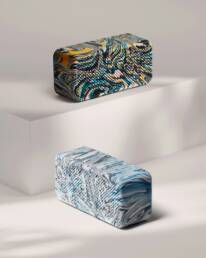Unlocking the Future: How Blockchain Revolutionizes the Fashion Industry
In an age where technological advancements are reshaping every aspect of our lives, the fashion industry stands at the cusp of transformation. Amidst the ever-evolving landscape, blockchain technology emerges as a disruptive force, promising to revolutionize the way we perceive, produce, and consume fashion.
At its core, blockchain is a decentralized, immutable ledger that records transactions across a network of computers. Initially associated with cryptocurrencies like Bitcoin, its potential applications extend far beyond finance. Now, blockchain is poised to disrupt the fashion industry, offering transparency, traceability, and trust throughout the entire supply chain.
Transparency in Sourcing and Production
One of the foremost challenges plaguing the fashion industry is the lack of transparency in sourcing and production. Consumers are increasingly demanding to know where their clothes come from and how they are made. Blockchain provides a solution by enabling brands to track every stage of the supply chain, from raw material extraction to the finished product.
Through blockchain, each component of a garment can be assigned a unique digital identity, recording its journey from the cotton field to the factory floor. This transparency not only fosters accountability but also empowers consumers to make informed choices about the brands they support.
One of the foremost challenges plaguing the fashion industry is the lack of transparency in sourcing and production.
Combatting Counterfeiting
Counterfeiting is a rampant issue in the fashion industry, causing billions of dollars in losses annually. Counterfeit products not only undermine brand reputation but also pose serious risks to consumer safety. Blockchain technology offers a robust solution to this problem by creating a tamper-proof record of authenticity.
By integrating blockchain into their supply chains, fashion brands can verify the authenticity of their products at every step of the distribution process. Consumers can scan a QR code or tap an NFC-enabled tag to access detailed information about the product’s origins, ensuring that they are purchasing genuine items.
Empowering Sustainable Practices
In an era marked by growing environmental concerns, sustainability has become a key priority for the fashion industry. Blockchain has the potential to drive sustainability initiatives by promoting transparency and accountability in sourcing and production processes.
By tracing the origins of raw materials, brands can ensure that they adhere to ethical and sustainable practices, such as fair labor conditions and environmentally friendly farming methods. Furthermore, blockchain can facilitate the recycling and reuse of materials, creating a closed-loop system that minimizes waste and reduces the industry’s carbon footprint.
Smart contracts, self-executing contracts with the terms of the agreement directly written into code, automate processes such as payments, shipments, and inventory tracking, reducing the need for manual intervention and minimizing the risk of errors or disputes.
Enhancing Supply Chain Efficiency
The fashion supply chain is notoriously complex, encompassing multiple stakeholders and numerous intermediaries. This complexity often leads to inefficiencies, delays, and discrepancies in inventory management. Blockchain technology streamlines the supply chain by creating a single, transparent source of truth that all parties can access in real-time.
Smart contracts, self-executing contracts with the terms of the agreement directly written into code, automate processes such as payments, shipments, and inventory tracking, reducing the need for manual intervention and minimizing the risk of errors or disputes. This not only improves efficiency but also reduces costs and enhances overall supply chain resilience.
Through blockchain-based platforms, consumers can participate in product customization, co-creation, and storytelling, immersing themselves in the brand's journey and values.
Fostering Consumer Engagement
In today’s digital age, consumers crave authenticity, engagement, and personalized experiences from the brands they support. Blockchain technology enables brands to forge deeper connections with their customers by offering unique, interactive experiences.
Through blockchain-based platforms, consumers can participate in product customization, co-creation, and storytelling, immersing themselves in the brand’s journey and values. Moreover, blockchain-powered loyalty programs incentivize repeat purchases and reward customer loyalty, fostering long-term relationships and brand advocacy.
Challenges and Future Outlook
While the potential benefits of blockchain in the fashion industry are vast, there are several challenges that must be overcome to realize its full potential. These include technological barriers, interoperability issues, regulatory concerns, and resistance to change from traditional stakeholders.
However, despite these challenges, the momentum behind blockchain adoption in the fashion industry continues to grow. As more brands recognize the value of transparency, sustainability, and innovation, they are increasingly turning to blockchain as a strategic tool for competitive differentiation and long-term success.
In conclusion, blockchain technology holds the promise of transforming the fashion industry from the inside out. By fostering transparency, combating counterfeiting, empowering sustainable practices, enhancing supply chain efficiency, and fostering consumer engagement, blockchain has the potential to unlock new possibilities and reshape the future of fashion as we know it. As we embrace this digital revolution, we embark on a journey towards a more transparent, ethical, and inclusive fashion ecosystem for generations to come.
Coralie Myrne
Coralie Myrne is a seasoned journalist with a keen eye for sustainable fashion trends, serving as the voice of conscience for "EcoStyle Insights." Combining her love for writing with a passion for environmental advocacy, she travels the world uncovering the stories behind eco-friendly designs and the innovators shaping the industry. With a commitment to authenticity and a dedication to promoting conscious consumerism, Coralie empowers readers to make informed choices while looking effortlessly stylish.










